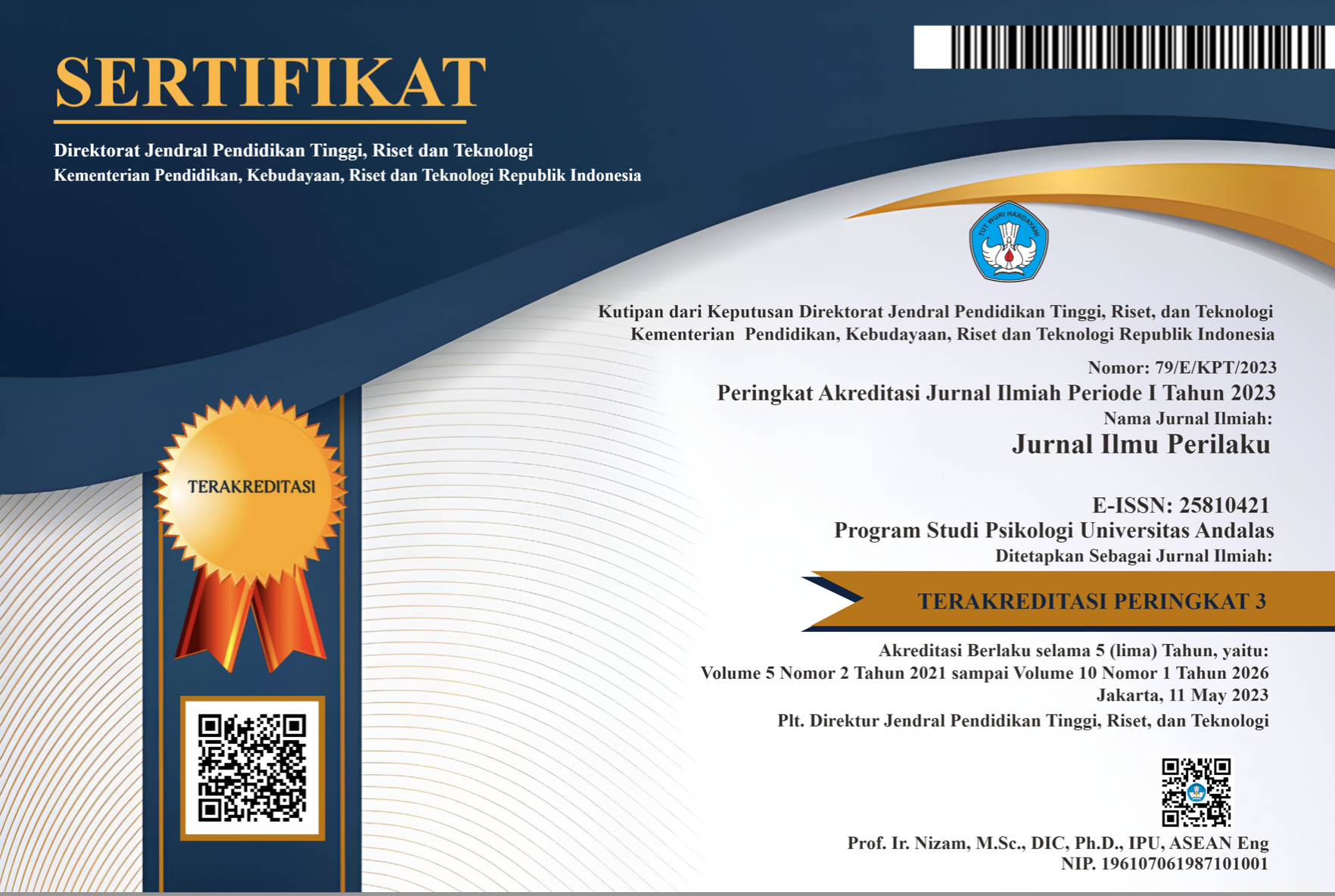Does the Stroop Task Induce Ego Depletion Effect? Brief Experimental Study Amoing Indonesian Students
Abstract
While there are pervasive canonical examples of the Stroop task effectiveness to induce the ego depletion effect, there were much less is known about how this paradigm used in the Indonesian samples. Our current study aims to investigate whether the Indonesian version of Stroop task would generate ego depletion effect. Seventy-five university students between the ages of 18 and 21 were randomly assigned into three groups, two depletion and one control conditions. The first and second groups respectively received incongruent and congruent Stroop stimulus through Psytoolkit online experimental psychology platform, and the third group received no stimulus. We administered the online Corsi block test to participants in the experimental group and compared their scores with the control group to determine whether or not ego depletion effect, induced by the Stroop task, had occurred. The findings of this online experimental study demonstrate that there were no significant differences (p > .001) in participants' spatial span scores across three groups. The findings of this study suggest that performing the Stroop task to elicit the ego depletion effect should be carried out with caution. Its implication and recommendation for future research are discussed in the paper.
Downloads
References
André, N., Audiffren, M., & Baumeister, R. F. (2019). An integrative model of effortful control. Frontiers in Systems Neuroscience, 13, 79.
Alós-Ferrer, C., Ritschel, A., García-Segarra, J., & Achtziger, A. (2019). Habituation does not rescue depletion: Two tests of the ego-depletion effect. Journal of Economic Psychology, 75, 102122.
Baumeister, R. F., Bratslavsky, E., Muraven, M., & Tiee, D. M. (1998). Ego Depletion: Is the Active Self a Limited Resource? Journal or Personality ami Social Psychology, 74(5), 1252-1265. 10.1037//0022-3514.74.5.1252
Baumeister, R. F., Vohs, K. D., & Tice, D. M. (2007). The strength model of self-control. Current directions in psychological science, 16(6), 351-355.
Bench, S. W., & Lench, H. C. (2019). Boredom as a seeking state: Boredom prompts the pursuit of novel (even negative) experiences. Emotion, 19(2), 242.
Carter, E. C., & Kofler, L. M. (2015). A Series of Meta-Analytic Tests of the Depletion Effect: Self-Control Does Not Seem to Rely on a Limited Resource. Journal of Experimental Psychology: General, 144(4), 796-815. 10.1037/xge0000083
Calvillo, D. P., Rodriguez, K., & Nguyen, T. N. (2021). A within-subjects test of ego depletion and potential moderators. The Journal of General Psychology, 1-15.
Chaudhuri, A., & Behan, P. O. (2004). Fatigue in neurological disorders. The Lancet, 363, 978-
988
Dang, J., Liu, Y., Liu, X., & Mao, L. (2017). The ego could be depleted, providing initial exertion is depleting: A preregistered experiment of the ego depletion effect. Social Psychology, 48(4), 242.
Dang, J., Barker, P., Baumert, A., Bentvelzen, M., Berkman, E., Buchholz, N., Buczny, J., Chen, Z., De Cristofaro, V., de Vries, L., Dewitte, S., Giacomantonio, M., Gong, R., Homan, M., Imhoff, R., Ismail, I., Jia, L., Kubiak, T., Lange, F., … Zinkernagel, A. (2021). A multilab replication of the ego depletion effect. Social Psychological and Personality Science, 12(1), 14–24. https://doi.org/10.1177/1948550619887702
Dorris, D. C., Power, D. A., & Kenefick, E. (2012). Investigating the effects of ego depletion on physical exercise routines of athletes. Psychology of Sport and Exercise, 13(2), 118-125.
Fischer, P., Kastenmüller, A., & Asal, K. (2012). Ego depletion increases risk-taking. The Journal of Social Psychology, 152(5), 623-638.
Hagger, M. S., Wood, C., Stiff, C., & Chatzisarantis, N. L. D. (2010). Ego Depletion and the Strength Model of Self-Control: A Meta-Analysis. Psychological Bulletin, 136(4), 495-525. 10.1037/a0019486
Hurley, P. J. (2019, Maret 11). Ego Depletion and Auditors' JDM Quality. Accounting, Organizations and Society, 77, 1-12. https://doi.org/10.1016/j.aos.2019.03.001
Hofmann, W., Schmeichel, B. J., & Baddeley, A. D. (2012). Executive functions and self-regulation. Trends in cognitive sciences, 16(3), 174-180.
Inzlicht, M., & Gutsell, J. N. (2007). Running on empty: Neural signals for self-control failure. Psychological science, 18(11), 933-937.
Inzlicht, Michael, & Friese, M (2019). "The past, present, and future of ego depletion." Special Issue: Ego Depletion and Self-Control: Conceptual and Empirical Advance. DOI: /doi.org/10.1027/1864-9335/a000398
JASP (Version 0.16.3)[Computer software]
Macleod, C. M. (1991). John Ridley Stroop: Creator of a Landmark Cognitive Task. Canadian Psychology/Psychologie canadienne, 32(3), 521-524. 10.1037/h0079012
Mangin, T., André, N., Benraiss, A., Pageaux, B., & Audiffren, M. (2021). No ego-depletion effect without a good control task. Psychology of Sport and Exercise, 57, 102033.
Oehring, D. (2020). Prayer as a Potential Buffer Against Ego Depletion (Electronic Theses and Dissertations ed., Vol. 2118). Georgia Southern University. https://digitalcommons.georgiasouthern.edu/etd/2118
Otgaar, H., Alberts, H., & Cuppens, L. (2012). Ego depletion results in an increase in spontaneous false memories. Consciousness and cognition, 21(4), 1673-1680.
Osgood, J. M. (2017). Effect of Ego-Depletion Typing Task on Stroop Does Not Extend to Diverse Online Sample. Journal of Articles in Support of the Null Hypothesis, 13(2).
Schmeichel, B. J., Vohs, K. D., & Baumeister, R. F. (2003). Journal of Personality and Social Psychology. Intellectual performance and ego depletion: role of the self in logical reasoning and other information processing, 85(1), 33-36. 10.1037/0022-3514.85.1.33
Steimke, R., Stelzel, C., Gaschler, R., Rothkirch, M., Ludwig, V. U., Paschke, L. M., ... & Walter, H. (2016). Decomposing self-control: individual differences in goal pursuit despite interfering aversion, temptation, and distraction. Frontiers in psychology, 7, 382.
Stoet, G. (2017). PsyToolkit. PsyToolkit. Retrieved June 28, 2022, from https://www.psytoolkit.org/
Shenhav, A., Musslick, S., Lieder, F., Kool, W., Griffiths, T. L., Cohen, J. D., & Botvinick, M. M. (2017). Toward a rational and mechanistic account of mental effort. Annual review of neuroscience, 40, 99-124.
Singh, R. K., & Goritz, A. S. (2018, April 12). Ego Depletion Does Not Interfere With Working Memory Performance. Frontiers in Psychology, 9(538), 1-10. 10.3389/fpsyg.2018.00538
Undarwati, A., Mahabati, A., Khaerani, A. C., Hapsari, A. D., Kristanto, A., Stephany, E. S., & Prawitasari, J. E. (2017, Maret 1). Pengukuran Ego Depletion Berbasis Indigeneous Psychology. Intuisi Jurnal Psikologi Ilmiah, 9(1), 67-73. Retrieved Maret 30, 2022,
Vandierendonck, A., Kemps, E., Fastame, M., & Szmalec, A. (2004). Working memory components of the Corsi blocks task. British Journal of Psychology, 95(1), 57-79.
Westgate, E. C., & Wilson, T. D. (2018). Boring thoughts and bored minds: The MAC model of boredom and cognitive engagement. Psychological Review, 125(5), 689.
The non-commercial use of the article is governed by the Creative Commons Attribution license as currently displayed on Creative Commons Attribution-NonCommercial-ShareAlike 4.0 International License.
JIP's spirit is to disseminate articles published are as free as possible. Under the Creative Commons license, JIP permits users to copy, distribute, display, and perform the work for non-commercial purposes only. Users will also need to attribute authors and JIP on distributing works in the journal.
Please find the rights and licenses in Jurnal Ilmu Perilaku (JIP).
- License
The non-commercial use of the article will be governed by the Creative Commons Attribution license as currently displayed on Creative Commons Attribution-NonCommercial-ShareAlike 4.0 International License.
- Author’s Warranties
The author warrants that the article is original, written by stated author(s), has not been published before, contains no unlawful statements, does not infringe the rights of others, is subject to copyright that is vested exclusively in the author and free of any third party rights, and that any necessary written permissions to quote from other sources have been obtained by the author(s).
- User Rights
JIP's spirit is to disseminate articles published are as free as possible. Under the Creative Commons license, JIP permits users to copy, distribute, display, and perform the work for non-commercial purposes only. Users will also need to attribute authors and JIP on distributing works in the journal.
- Rights of Authors
Authors retain the following rights:
- Copyright, and other proprietary rights relating to the article, such as patent rights,
- The right to use the substance of the article in future own works, including lectures and books,
- The right to reproduce the article for own purposes, provided the copies are not offered for sale,
- The right to self-archive the article.
- Co-Authorship
If the article was jointly prepared by other authors, the signatory of this form warrants that he/she has been authorized by all co-authors to sign this agreement on their behalf, and agrees to inform his/her co-authors of the terms of this agreement.
- Termination
This agreement can be terminated by the author or JIP upon two months’ notice where the other party has materially breached this agreement and failed to remedy such breach within a month of being given the terminating party’s notice requesting such breach to be remedied. No breach or violation of this agreement will cause this agreement or any license granted in it to terminate automatically or affect the definition of JIP.
- Royalties
This agreement entitles the author to no royalties or other fees. To such extent as legally permissible, the author waives his or her right to collect royalties relative to the article in respect of any use of the article by JIP or its sublicensee.
- Miscellaneous
JIP will publish the article (or have it published) in the journal if the article’s editorial process is successfully completed and JIP or its sublicensee has become obligated to have the article published. JIP may conform the article to a style of punctuation, spelling, capitalization, referencing and usage that it deems appropriate. The author acknowledges that the article may be published so that it will be publicly accessible and such access will be free of charge for the readers.










